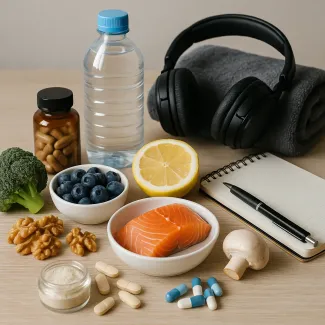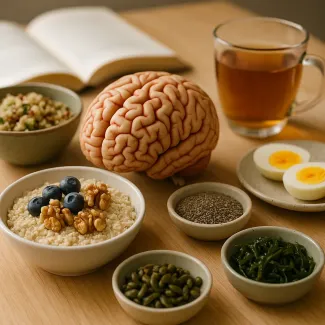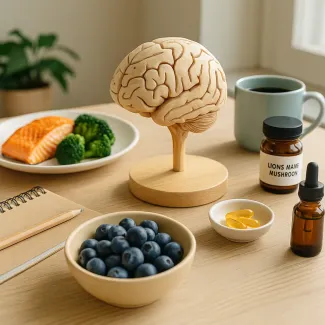
Unlocking Mental Vitality After 30: Natural Strategies That Work
Simple daily changes that strengthen memory, focus, and long-term energy
The connection between age, energy, and brain sharpness
After the age of 30, many people begin to notice subtle changes in their mental clarity, memory recall, and daily energy levels. Tasks that once seemed effortless can now feel slightly more demanding. These changes are natural, but they don’t have to be permanent. By understanding the biological shifts that occur after 30, it becomes easier to support brain health with sustainable lifestyle habits.
Hormonal fluctuations, increased stress levels, reduced sleep quality, and less physical activity all influence how sharp and energized we feel. Instead of relying on synthetic stimulants or temporary fixes, many people are turning to natural methods that support brain function and energy production long-term.
Nourish your brain with memory-supporting foods
The brain is a high-energy organ that requires constant fuel. The right foods can enhance memory, reduce inflammation, and promote neurotransmitter balance. Some of the best brain-friendly foods include:
Omega-3 rich fish
Fatty fish like salmon, sardines, and mackerel are loaded with DHA, an omega-3 fatty acid essential for brain structure and function. Regular consumption is linked to slower cognitive decline and improved concentration.
Leafy greens and cruciferous vegetables
Spinach, kale, and broccoli are packed with vitamins K, lutein, folate, and beta carotene—all linked to slower age-related cognitive decline. Their antioxidant properties help fight oxidative stress, a known contributor to memory loss.
Berries
Blueberries, blackberries, and strawberries contain flavonoids that support neuroplasticity, the brain’s ability to form new connections. They’ve been shown to improve both short-term memory and learning speed.
Nuts and seeds
Walnuts, almonds, chia, and flaxseeds provide healthy fats, vitamin E, and magnesium, which all contribute to better mood regulation and neural protection.
Sleep hygiene as a mental performance enhancer
Sleep isn’t just rest—it’s a critical phase of brain repair and memory consolidation. Many adults over 30 experience fragmented or insufficient sleep, which negatively affects attention, emotional regulation, and problem-solving.
Consistent bedtime routine
Going to bed and waking up at the same time daily trains the circadian rhythm, supporting deeper and more restorative sleep cycles. Avoid screens and bright light at least 60 minutes before bed.
Natural sleep aids
Magnesium glycinate, melatonin, and herbal teas with chamomile, valerian root, or passionflower can support relaxation and faster sleep onset.
Sleep environment optimization
Dark, quiet, and cool rooms are ideal for deep sleep. Consider blackout curtains, white noise machines, or eye masks to limit sensory disruptions.
Daily movement for cognitive stimulation
Physical activity stimulates the release of brain-derived neurotrophic factor (BDNF), a protein that encourages the growth of new neurons and connections. Regular movement is essential for mental agility, focus, and long-term memory.
Moderate aerobic exercise
Walking briskly for 30 minutes five times per week significantly boosts executive function. Cardio enhances blood flow to the brain, delivering oxygen and nutrients where they’re needed most.
Mind-body practices
Yoga and tai chi promote mental clarity through controlled breathing, balance, and awareness, which together help calm the nervous system and improve mental resilience.
Movement breaks during sedentary work
Taking a 2-minute stretch break every 30–45 minutes can reduce fatigue and improve cognitive performance throughout the day.
Hydration and its overlooked role in brain energy
Even mild dehydration can impair short-term memory, attention, and mood. The brain is about 75% water, and it requires hydration to maintain electrical activity and neurotransmitter production.
Optimal daily fluid intake
Aim for at least 2 liters (approx. 8 glasses) of fluids per day, including water, herbal teas, or diluted vegetable juices. Electrolytes such as potassium and sodium also play a key role in maintaining mental energy.
Reduce dehydrating substances
Limit alcohol, caffeinated beverages, and processed salty foods, which contribute to dehydration and brain fog. Replace with coconut water, cucumber-infused water, or lemon balm tea.
Natural supplements that support memory and energy
Some natural compounds have been studied for their ability to support cognitive performance and energy metabolism. While diet and sleep come first, these supplements can provide additional support.
Ginkgo biloba
An ancient plant extract that improves blood flow to the brain and may enhance memory recall and mental processing speed.
Rhodiola rosea
An adaptogen that helps regulate cortisol levels, reducing mental fatigue and promoting alertness under stress.
Panax ginseng
Traditionally used for energy enhancement, ginseng may support brain function by improving reaction time, focus, and verbal recall.
Lion’s Mane mushroom
Known for stimulating nerve growth factor (NGF), Lion’s Mane supports neurogenesis and is associated with improved cognitive clarity and mood stability.
Mindfulness and breathwork for mental clarity
Chronic stress impairs working memory and increases mental fatigue. Mindfulness helps by calming the nervous system and redirecting mental energy toward focus and present-moment awareness.
Daily meditation practice
Just 10 minutes per day of mindfulness meditation can lead to improvements in attention span, memory retention, and emotional regulation.
Breathwork techniques
Box breathing (inhaling, holding, exhaling, holding—each for 4 seconds) or alternate nostril breathing can improve oxygenation, reduce anxiety, and boost mental alertness.
Digital detoxing
Reducing screen time—especially social media—helps reclaim mental bandwidth, reduce overstimulation, and support deeper thinking and creativity.
Build mental sharpness with structured learning
The brain thrives on challenge and novelty. Stimulating the mind with new skills or information promotes neuroplasticity, strengthens memory circuits, and boosts confidence.
Learn a new language or instrument
Language acquisition and musical training activate multiple areas of the brain, improving working memory, attention, and problem-solving.
Brain games and puzzles
Sudoku, chess, crosswords, and memory games improve mental agility and logical thinking. Apps that track cognitive progress can provide added motivation.
Reading and journaling
Reading non-fiction or literary fiction expands vocabulary, comprehension, and mental imagery. Journaling improves emotional processing and reinforces memory consolidation through reflection.
Blood sugar balance and mental energy
Fluctuating blood sugar levels can cause energy crashes, irritability, and difficulty concentrating. Keeping blood sugar stable is essential for consistent brain energy.
Eat balanced meals
Combine complex carbohydrates, lean protein, and healthy fats in each meal to prevent blood sugar spikes and dips. Oats with nuts and berries, quinoa with vegetables, or hummus with whole-grain pita are excellent options.
Avoid sugary snacks
While sugar provides a quick burst of energy, it’s usually followed by a crash. Opt instead for slow-releasing snacks like boiled eggs, apple slices with almond butter, or carrot sticks with hummus.
Timing matters
Eating every 3–4 hours can support steady glucose availability, which helps maintain attention and mental performance throughout the day.
Connection and purpose as cognitive anchors
Strong social ties and a sense of life purpose have been linked to lower rates of cognitive decline and better mental health.
Nurture meaningful relationships
Spending time with supportive friends or family not only improves mood but also stimulates verbal memory, listening skills, and empathy-based cognition.
Volunteer or mentor
Helping others stimulates dopamine release, fosters positive identity, and keeps the brain engaged in goal-oriented thinking.
Stay curious
Having personal goals, exploring hobbies, or pursuing passion projects provides mental stimulation and a framework for long-term cognitive growth.
Limit toxins and support brain detox pathways
Everyday toxins—from air pollution to food additives—can impair neuronal health. Supporting the body’s natural detoxification systems benefits brain clarity and energy.
Avoid artificial additives
MSG, aspartame, and certain food dyes can negatively affect neurotransmitter balance. Focus on whole foods, organic produce, and clean-label products whenever possible.
Support liver function
Cruciferous vegetables (like Brussels sprouts and cauliflower), milk thistle, and dandelion root help detoxify the liver, an essential organ in clearing neurotoxic substances.
Encourage lymphatic drainage
Regular physical movement, dry brushing, and staying hydrated all assist in removing metabolic waste from the brain and body.
Protect your brain with healthy habits
The cumulative effect of small, daily practices can dramatically improve how your brain feels and functions. By prioritizing nourishment, movement, rest, and mental challenge, you can protect your cognitive health and unlock a more energized, focused, and resilient version of yourself—naturally.





